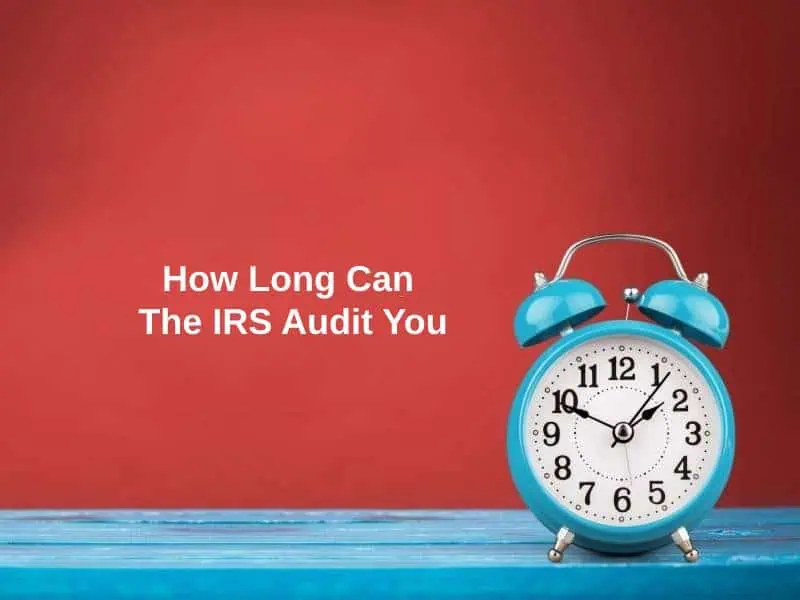Exact Answer: 3 Years
It’s only normal to be concerned about an IRS audit, and the length of audit periods can be terrifying. If we look at some tax attorney, he keeps track of the length of your audit exposure if you hire them. Not just this, if you go for an accountant, he also does the same job efficiently. Keep an eye on the calendar until the audit is over. Most of the time, this will be three or six years after you file your tax return.
However, even if you filed and thought everything was in order, the IRS’s authority to audit you may never expire due to the statute of limitations. The IRS can audit you for three years after you file, but many circumstances allow the IRS to audit you for six years or more.

How Long Can The IRS Audit You?
| Condition | Time |
| Without Any Issue | 3 Years |
| With Issues | More Than 3 Years |
The legal solution is first found in the tax code. The IRS has three years from the date you submitted your return or April 15, to charge you additional taxes, except in circumstances of fraud or a back tax return. The assessment statute of limitations is three years in length. An audit or a CP2000 is the most common way of collecting more taxes.
Even though the IRS has the legal authority to audit you until the three-year assessment period expires, this rarely happens in practice. The practical solution can be found in the IRS’s examination cycle, a procedural policy. IRS agents must initiate and close audits within 26 months of the return’s filing or due date, according to the Internal Revenue Manual.
The IRS frequently freezes refunds during audits. Because the IRS must pay interest on late-paid refunds, it seeks to complete audits as swiftly as possible. They’re frequently sent in the mail. The IRS will release your refund once you have answered the IRS’ queries concerning the accuracy of your return.
Tax credits, such as the earned income tax credit and the child tax credit, are frequently the target of audits that begin immediately after filing. Before delivering your refund, the IRS may wish to verify your filing status, dependents, and other return elements. If the IRS audits you, you’ll receive notice that your return has been selected for review. It might be tough to deal with the IRS during an audit. The best course of action is to answer promptly, completely, and passionately about your tax return situation.
Why Can The IRS Audit You For That Long?
IRS audit procedures can be difficult to understand and navigate. For taxpayers who are being audited, an experienced tax professional who can “speak IRS” will almost certainly provide a better result with less worry and anxiety. Look for a CPA, enrolled agent, or attorney who is licenced to practise before the IRS and has prior IRS expertise.
A tax professional’s representation in a postal or office audit should cost you a few hundred dollars. Because your tax expert will be spending a lot of time with the IRS during a field audit, it will likely be more expensive. The IRS’s ability to audit you in the past is contingent on several variables. The IRS has three years to audit you in most cases, but it may have up to six years in some cases.
In some cases, the IRS may have an indefinite period to audit you. Consider getting your return prepared by an expert. It is a good idea to report your offshore accounts on your tax returns. Not just this, you also need to be sure to file the necessary documents as it can extend the statute of limitations for you to 6 years. Avoid tax shelters and what the IRS considers listed transactions, which might lead to trouble.
Consider seeking specialised tax assistance from a tax lawyer or CPA if you have significant tax difficulties related to a specific situation, such as a lawsuit recovery or a casualty loss. Consider seeking expert help if the IRS contacts you. Don’t disregard the IRS, but be cautious about what you do and say. Issues can sometimes be resolved quickly and easily if handled properly. Before filing, think about your audit risk. The IRS will not accept your tax return until you sign it.
Conclusion
It can be nerve-wracking to figure out whether the statute of limitations applies to you and then wait for it to run out. An audit might ask specific questions or demand verification of almost anything. The IRS frequently claims that auditing takes longer than expected. The IRS will ask you to sign a paper that will allow you to extend the statute of limitations for another year.
If you refuse to sign, the IRS will issue you a tax bill based on negative assumptions. The majority of tax professionals encourage their customers to accept the extension. However, you should get professional help for your specific case. You might be able to restrict the extension’s length or scope.